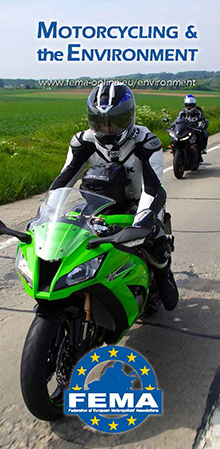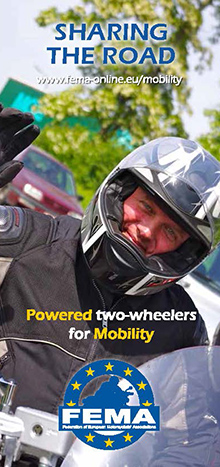The Federation of European Motorcyclists Associations (FEMA) says it is driving the debate on Motorcycling, mobility and the environment, with the publication of position papers on two of the topics at the top of the political agenda: protection of the environment, and transport policies.
FEMA says, “Riders at FEMA did their homework” saying that, “the vehicle of tomorrow might not be a car!”
Motorcycling, mobility and the environment: FEMA drives the debate
11th October 2011
 Riders at FEMA did their homework with the publication of position papers on two of the topics at the top of the political agenda: protection of the environment, and transport policies.
Riders at FEMA did their homework with the publication of position papers on two of the topics at the top of the political agenda: protection of the environment, and transport policies.
“The two publications, based on positions discussed and agreed democratically by FEMA’s member organisations, represent the riders’ contribution to the political debate, within the European institutions and beyond.
“Motorcycling and the Environment” offers a unique analysis on the position of powered two-wheelers in the debate surrounding climate change and fossil energy use.
While the public debate tends to focus solely on cars as the only form of personal motorized transport, FEMA offers an alternate view, taking motorcycles and scooters into account for the first time.
What part do two-wheelers play in the transport mix?
How can they improve their emissions performance, and how can they contribute to greener, more efficient transport?
 Beyond the challenges of global warming and peak oil, the paper looks at the motorcycle of tomorrow, offering an overview of concepts and technologies for the motorcycle of tomorrow: a vehicle that delivers clean, affordable and practical personal transport.
Beyond the challenges of global warming and peak oil, the paper looks at the motorcycle of tomorrow, offering an overview of concepts and technologies for the motorcycle of tomorrow: a vehicle that delivers clean, affordable and practical personal transport.
And while keeping an open mind – the vehicle of tomorrow might not be a car!
On a related note, but addressing wider issues, FEMA’s work on “Motorcycling and Mobility” looks at current needs, solutions and policies for better personal mobility, and how it fits in the society we want in the near future.
With an massively urban and increasingly mobile population, can Europe still rely on the solutions of the 20th century?
The choice is not only between car and public transport, as powered two-wheelers can play a role too, with unique capabilities and characteristics that make them irreplaceable. In reducing congestion, easing the pressure on parking demand and keeping transport affordable, they already help keeping urban transport manageable today.
Concrete example of pragmatic measures for better two-wheeler mobility across Europe, the paper is a useful resource for policy-makers and researchers looking for solutions.”
The two documents that FEMA have published with additional resources dedicated to transport policy and the environment can be found at:
Transport Policy – Click Here
Environment Issues – Click Here
Original Source – Click Here


Speak Your Mind